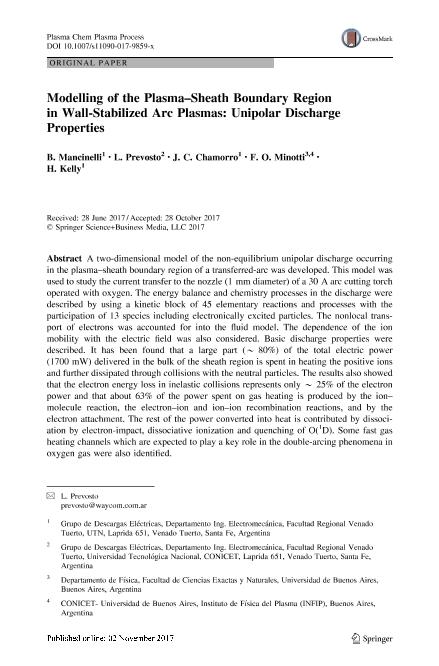Mostrar el registro sencillo del ítem
dc.contributor.author
Mancinelli, Beatriz Rosa

dc.contributor.author
Prevosto, Leandro

dc.contributor.author
Chamorro Garcés, Juan Camilo

dc.contributor.author
Minotti, Fernando Oscar

dc.contributor.author
Kelly, Hector Juan

dc.date.available
2019-01-11T17:17:41Z
dc.date.issued
2018-01
dc.identifier.citation
Mancinelli, Beatriz Rosa; Prevosto, Leandro; Chamorro Garcés, Juan Camilo; Minotti, Fernando Oscar; Kelly, Hector Juan; Modelling of the Plasma–Sheath Boundary Region in Wall-Stabilized Arc Plasmas: Unipolar Discharge Properties; Springer; Plasma Chemistry And Plasma Processing; 38; 1; 1-2018; 147-176
dc.identifier.issn
0272-4324
dc.identifier.uri
http://hdl.handle.net/11336/67929
dc.description.abstract
A two-dimensional model of the non-equilibrium unipolar discharge occurring in the plasma–sheath boundary region of a transferred-arc was developed. This model was used to study the current transfer to the nozzle (1 mm diameter) of a 30 A arc cutting torch operated with oxygen. The energy balance and chemistry processes in the discharge were described by using a kinetic block of 45 elementary reactions and processes with the participation of 13 species including electronically excited particles. The nonlocal transport of electrons was accounted for into the fluid model. The dependence of the ion mobility with the electric field was also considered. Basic discharge properties were described. It has been found that a large part (~ 80%) of the total electric power (1700 mW) delivered in the bulk of the sheath region is spent in heating the positive ions and further dissipated through collisions with the neutral particles. The results also showed that the electron energy loss in inelastic collisions represents only ~ 25% of the electron power and that about 63% of the power spent on gas heating is produced by the ion–molecule reaction, the electron–ion and ion–ion recombination reactions, and by the electron attachment. The rest of the power converted into heat is contributed by dissociation by electron-impact, dissociative ionization and quenching of O(1D). Some fast gas heating channels which are expected to play a key role in the double-arcing phenomena in oxygen gas were also identified.
dc.format
application/pdf
dc.language.iso
eng
dc.publisher
Springer

dc.rights
info:eu-repo/semantics/openAccess
dc.rights.uri
https://creativecommons.org/licenses/by-nc-sa/2.5/ar/
dc.subject
Plasma&Ndash;Sheath
dc.subject
Unipolar Discharge
dc.subject
Wall-Stabilized Arc
dc.subject.classification
Astronomía

dc.subject.classification
Ciencias Físicas

dc.subject.classification
CIENCIAS NATURALES Y EXACTAS

dc.title
Modelling of the Plasma–Sheath Boundary Region in Wall-Stabilized Arc Plasmas: Unipolar Discharge Properties
dc.type
info:eu-repo/semantics/article
dc.type
info:ar-repo/semantics/artículo
dc.type
info:eu-repo/semantics/publishedVersion
dc.date.updated
2019-01-04T21:37:34Z
dc.journal.volume
38
dc.journal.number
1
dc.journal.pagination
147-176
dc.journal.pais
Estados Unidos

dc.journal.ciudad
Nueva York
dc.description.fil
Fil: Mancinelli, Beatriz Rosa. Universidad Tecnológica Nacional. Facultad Regional Venado Tuerto; Argentina
dc.description.fil
Fil: Prevosto, Leandro. Consejo Nacional de Investigaciones Científicas y Técnicas; Argentina. Universidad Tecnológica Nacional. Facultad Reg.venado Tuerto. Departamento de Ing.electromecanica; Argentina
dc.description.fil
Fil: Chamorro Garcés, Juan Camilo. Consejo Nacional de Investigaciones Científicas y Técnicas; Argentina. Universidad Tecnológica Nacional. Facultad Regional Venado Tuerto; Argentina
dc.description.fil
Fil: Minotti, Fernando Oscar. Consejo Nacional de Investigaciones Científicas y Técnicas. Oficina de Coordinación Administrativa Ciudad Universitaria. Instituto de Física del Plasma. Universidad de Buenos Aires. Facultad de Ciencias Exactas y Naturales. Instituto de Física del Plasma; Argentina. Universidad de Buenos Aires. Facultad de Ciencias Exactas y Naturales. Departamento de Física; Argentina
dc.description.fil
Fil: Kelly, Hector Juan. Universidad Tecnológica Nacional. Facultad Regional Venado Tuerto; Argentina. Consejo Nacional de Investigaciones Científicas y Técnicas; Argentina
dc.journal.title
Plasma Chemistry And Plasma Processing

dc.relation.alternativeid
info:eu-repo/semantics/altIdentifier/doi/http://dx.doi.org/10.1007/s11090-017-9859-x
dc.relation.alternativeid
info:eu-repo/semantics/altIdentifier/url/https://link.springer.com/article/10.1007/s11090-017-9859-x
Archivos asociados
